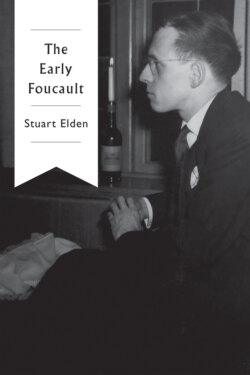The Early Foucault

Реклама. ООО «ЛитРес», ИНН: 7719571260.
Оглавление
Stuart Elden. The Early Foucault
CONTENTS
Guide
Pages
The Early Foucault
Acknowledgements
Abbreviations and Archival References
Texts by Foucault and others
Archival material
Note
Introduction
Reading and Writing
Structure of this Study
Notes
1 Studying Philosophy and Psychology in Paris
Philosophy and its History
Jean Hyppolite and the Diploma Thesis on Hegel
Psychology
Louis Althusser, Georges Canguilhem and theAgrégation
Notes
2 Teaching at Lille and the École Normale Supérieure
‘Connaissance de l’homme et réflexion transcendantale’
The Binswanger Manuscript
‘Phénoménologie et psychologie’
Other Materials
Hospitals and Prisons
Publications
Notes
3 Psychology and Mental Illness
‘La Psychologie de 1850 à 1950’
‘La Recherche scientifique et la psychologie’
Maladie mentale et personnalité
Notes
4 Translating Binswanger and von Weizsäcker
Introducing Binswanger
Dating and Legacy
Translating von Weizsäcker
Political Controversy
Notes
5 Nietzsche and Heidegger
Encountering Nietzsche in the 1950s
Through Heidegger
Jean Barraqué
Notes
6 Madness – Uppsala to Warsaw
The Maison de France and the Carolina Rediviva
La Table Ronde and Sten Lindroth
Warsaw
History of Madness
Notes
7 Hamburg, Kant
Situating Kant
Translating Kant
Introducing Kant: Anthropology and the Question of Man
Notes
8 Defence, Publication, Reception, Revision
Reception
Rewriting the Past
Maladie mentale et psychologie
The 1964 Abridgement ofFolie et déraison
Notes
Coda: Towards Archaeology
Notes
Index. A
B
C
D
E
F
G
H
I
J
K
L
M
N
O
P
R
S
T
U
V
W
Y
Z
POLITY END USER LICENSE AGREEMENT
Отрывок из книги
This book is the third of four major intellectual histories of Michel Foucault, exploring newly released archival material and covering the French thinker’s entire academic career.
Foucault’s Last Decade was published by Polity in 2016. Foucault: The Birth of Power was published in 2017. The Archaeology of Foucault will publish in the early 2020s.
.....
Alongside this work on philosophy, Foucault was also studying psychology. Foucault’s formal teachers included Lagache, who established the diploma in psychology at the Sorbonne and with Jacques Lacan formed the breakaway Société française de psychanalyse in 1953.102 Lacan pays tribute to Lagache’s work in Écrits, devoting a whole essay to him.103 Foucault also attended classes by the neurologist and psychiatrist Ajuriaguerra who was in 1975 elected to a chair at the Collège de France.104 Of course, not all the influences came from the classroom: Foucault was a voracious reader too. Georges Politzer’s 1928 work, Critique of the Foundations of Psychology, was certainly important.105 Politzer was a PCF theorist, executed by the Gestapo in 1942, who made one of the few PCF contributions to psychological theory.106 In the early 1920s Politzer was one of the members of the Philosophies group of whom Georges Friedmann, Norbert Guterman and Lefebvre were also members.107 Politzer translated Friedrich Schelling’s La Liberté humaine, to which Lefebvre contributed a long introduction – one of his first major publications – in 1926.108 Politzer is also known for La Crise de la psychologie contemporaine,109 and was influential to Merleau-Ponty, Lacan and Laplanche.110
Politzer is critical of recent developments in psychology, with an explicit focus on Freud and The Interpretation of Dreams. His key innovation is to critique the distinction between manifest and latent contents of mental life,111 and to propose what he calls ‘concrete psychology’. For Politzer there is only one field of consciousness, and he therefore is strongly critical of Freud’s turn to abstraction, his metapsychology, especially in the light of his earlier promise of a more concrete work. Metapsychology detached psychology from empirical evidence, and Politzer is too much of a phenomenologist for that to be valid. ‘Metapsychology has lived its life, and the history of psychology is beginning.’112 Politzer is also critical of the scientific pretensions of modern psychology: ‘We need to understand that psychologists are scientists like evangelized wild tribes are Christian.’113 The Critique was intended to begin a three-volume study, Matériaux pour la Critique des fondements de psychologie,114 with ‘another volume on Gestalt theory, with a chapter on phenomenology’, and a third on ‘behaviourism and its different forms with a chapter on applied psychology’.115 While this work was cut short by his execution, it would be developed by many who followed his inspiration.
.....